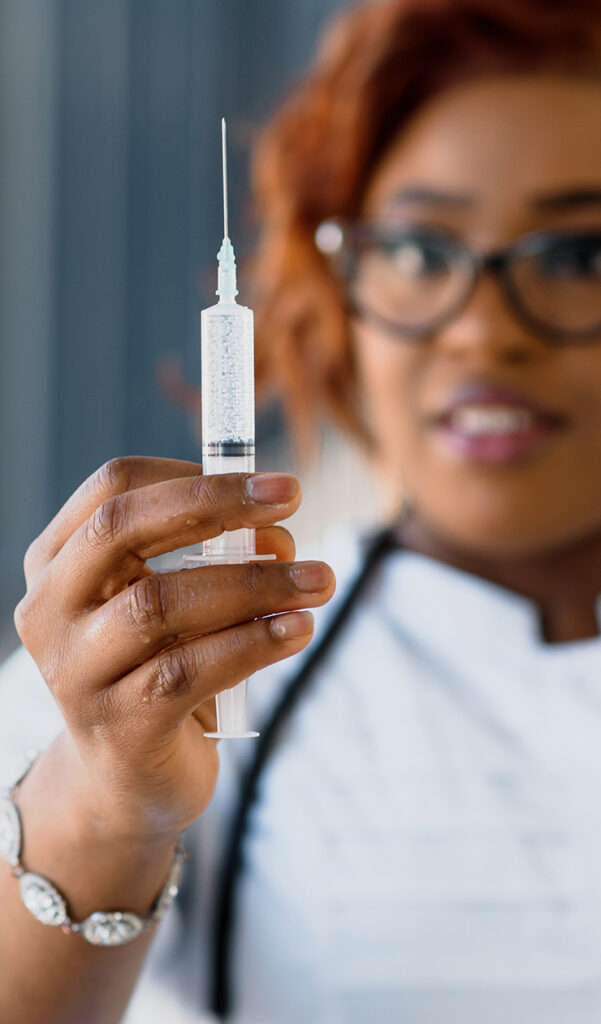“..the job of those involved in COVID-19 and HIV science is to educate people to enable them to make informed decisions. And, the simplest way is to tell people that vaccine won’t kill but COVID-19 can..”
Reverend Rob Newells, Director, National Program, Black AIDS Institute
Wake Up Wednesday COVID videos:
Every Wednesday, Myriam Johnstone, BAI’s Biomedical Program Manager answers your questions about COVID and the vaccines. We understand that it’s been hard to keep up with the fast-changing information about COVID. And we want you to know better so you can do better to protect yourself and your loved ones. Watch all episodes on our YouTube playlist here!
COVID-19 and Black America

Black Americans are dying of COVID-19 disease at almost 3 times the rate of White Americans. This information comes as no surprise, given the violent history of racial discrimination against Black people within the healthcare system and beyond. These health disparities prove that racism is a public health crisis to this day.
Building upon 21 years of fighting to end the HIV epidemic, Black AIDS Institute (BAI) understands how to educate and engage Black Americans to make informed health decisions. Our efforts and commitment extend to the current COVID-19 pandemic that is disproportionately impacting our community.
We are here to keep you informed and empowered, as we all continue to fight for our right to live long, healthy lives.
COVID-19 Vaccine Community Engagement Program
As information about COVID-19 and vaccine options is frequently evolving, it is more important than ever to understand how the science impacts us. It is why we are committed to translating science into “everyday language,” as well as navigating the real and understandable mistrust that exists in Black communities toward America’s healthcare system.
Our goal is to offer trusted resources and build self-determination, especially when faced with medical racism, and to empower advocates to hold medical professionals and local governments accountable for treating Black Americans with equitable respect.
To do so, we have partnered with the COVID-19 Vaccine Prevention Network (CoVPN) that is funded by the National Institute of Allergies and Infectious Diseases (NIAID), which is a part of the National Institutes of Health. Our partnership will produce monthly webinars, trainings, and videos to address the COVID-19 vaccine development process, clinical research, and medical mistrust.
EDUCATIONAL RESOURCES
Video: Addressing 9 COVID-19 Myths and Facts
Video: How Can Vaccine and Antibody Studies Move So Quickly And Still Be Safe?
Infographic: COVID Vaccines – What Do They Do?
Infographic: 3 Reasons To Continue COVID Vaccine Research
Infographic: COVID Vaccines – How Did We Get Them So Fast?
Infographic: Messenger RNA (mRNA) Vaccines – Are They Safe?
Infographic: Herd Immunity and COVID Vaccines
COVID VACCINES: FREQUENTLY ASKED QUESTIONS: Updated: September 23rd, 2021
1. Why are COVID-19 vaccines an important option?
All three vaccines—Moderna, Pfizer, and Johnson & Johnson—are currently the only forms of protection against severe COVID-19 disease.
2. What are booster shots and who needs them?
(a) A “booster shot” refers to another dose of a vaccine given to someone who built enough protection after vaccination, but had the protection decrease over time. This happens with many common vaccines, such as whooping cough, tetanus, flu, etc. (7).
(b) CDC recommends everyone stay up to date with COVID-19 vaccination, including all primary series doses and boosters for their age group:
- People ages 6 months through 4 years should get all COVID-19 primary series doses.
- People ages 5 years and older should get all primary series doses, and the booster dose recommended for them by CDC, if eligible.
- People ages 5 years to 11 years are currently recommended to get the original (monovalent) booster.
- People ages 12 years and older are recommended to receive one updated Pfizer or Moderna (bivalent) booster.
- This includes people who have received all primary series doses and people who have previously received one or more original (monovalent) boosters.
- At this time, people aged 12 years to 17 years can only receive the updated Pfizer bivalent booster.
3. Can I receive a second booster shot?
Yes, adults over the age of 18 can receive the updated Pfizer or Moderna bivalent booster shot if they have already received the monovalent booster.
4. Are the COVID-19 vaccines safe?
The FDA will not provide emergency use authorization nor full approvals unless extensive trials that include diverse populations have been conducted. Trials must prove both the effectiveness and safety of a vaccine.
5. Are the COVID-19 vaccines safe for people living with HIV?
(a) The U.S. vaccine safety system makes sure all vaccines are as safe as possible. People with HIV were included in clinical trials. COVID-19 vaccines have gone through the same safety tests and met the FDA’s rigorous scientific standards needed to support emergency use authorization.
(b) People who have a condition or are taking medications that weaken their immune system may not be protected, even if they are fully vaccinated. They should continue to take all precautions recommended for unvaccinated people, including wearing a well-fitted mask until advised otherwise by their healthcare provider. (4)
6. Can children receive the vaccine?
CDC recommends everyone ages 6 months and older get vaccinated against COVID-19. According to the CDC, the Moderna and Pfizer vaccines are available for people ages to 6 months to 17 years and the Novavax vaccine is available for people ages 12 years to 17 years.
7. What are the side effects of the COVID-19 vaccines?
Common side effects are possible on the arm where the vaccine was administered: pain and swelling
Common side effects are possible throughout the rest of the body: fever, chill, tiredness, and headaches (6)
For more information or questions about the COVID Vaccine Education Program, please contact Myriam Johnstone, Biomedical Research Training and Education Program Manager, Black AIDS Institute.
